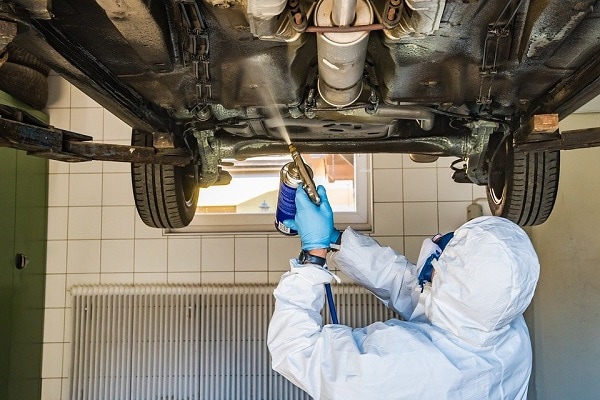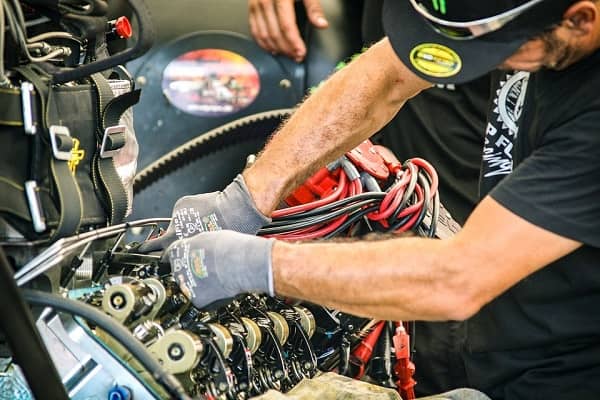Automobiles are an integral part of our daily lives. Be it commuting for our jobs, running errands, or piling in for the next family road trip, most of us prefer our own sedans and SUVs to do the job. We love our cars so much it only makes sense we want someone qualified to be in charge of their repair and maintenance.
Becoming certified can help put your clients at ease. Your skills can attract more customers; you can be more hirable, improve your prospects of a higher salary, and possibly kickstart your own business.
Unfortunately, most automotive service technicians are unclear on the certifications that they should get. Should you go for an ASE certification or a manufacturer’s certification?
What areas can you obtain a certification in? Can certifications really help automobile technicians with their career growth? Keep reading to learn answers to these questions and more.
Table of Contents
What are the Types of Auto Mechanics?
-
Apply for a mechanic degree at NEIT!
Loading…
/**/
As cars become increasingly complex with a network of intricate electrical and mechanical components, auto mechanics have evolved to specialized roles. Depending upon your chosen work area, you will require a specific set of training and skills to obtain your certification.
You can classify auto mechanics into these major focus areas:
- Diagnostic Technician: An auto repair technician who diagnoses the health of your engine, checks your engine performance, identifies problems, and performs engine repair and maintenance to keep your cars running smoothly and efficiently.
- Transmission Technicians: Automotive repair technicians who work on the transmission system of your cars, such as the gear trains, clutches, and couplings.
- Brake Technicians: A brake technician ensures your brake linings, brake pads, brake fluids, and rotors work well. They adjust, repair, and replace the braking system of your car.
- Front-end Technicians: These technicians diagnose the ride and handling aspects of an automobile, such as the wheel alignment, tires, steering, and suspension systems.
- Automotive Air-conditioning Technicians: The auto technician who specializes in automotive air-conditioning. These technicians install and repair the heating and cooling systems in your car.
- Automotive Body and Glass Repairer Technicians: They replace and restore your vehicle bodies, windshields, and window glasses. They also refinish the paint, and dents on your car.

What is an ASE Certification?
The National Institute for Automotive Service Excellence (ASE) is an independent, non-profit organization that tests and certifies auto mechanics and technicians. An ASE certification is the standard credential that helps identify auto mechanics who have the desired knowledge and skills to efficiently diagnose, repair, and service cars, light trucks, SUVs, and school buses.
You have to be physically present at the testing center for a computer-based test that consists of 40-75 multiple choice questions to assess your knowledge. You can prepare for your test and familiarize yourself with the test environment by taking National Institute for Automotive Service Excellence (NIASE)’s sample tests online.
Once you have registered for the test and paid the testing fee, you can give your test on the allotted date. If you clear this test, NIASE will certify you as a skilled repair technician.
How to get an ASE Recertification?
The ASE certification is valid for five years, after which you can apply for recertification tests by paying the prescribed fee. You can also use the ASE Renewal App to conveniently extend the date of your certification from your phone, tablet, or PC without having to visit the test center.
The app will deliver 1 question per month per certification area and deliver 1 credit for every question you answer correctly. After you earn 8 credits in one certification area, you receive a 1-year extension to your certificate.
The 8 Core Areas of Auto Mechanic Certification
ASE offers different certificates for each vehicle type, such as cars, trucks, buses, and secondary systems. There are eight core certifications for each vehicle type that demonstrate your knowledge of repair and maintenance.
The career path for an auto mechanic generally starts at the Automobile and Light Truck repair shops and service centers. Fresh graduates and entry-level mechanics can start with the A-series exams(A1-A8), also known as core areas, for a fulfilling career in the automotive industry.
START YOUR AUTOMOTIVE CAREER
Earn your degree in Automotive Technology from NEIT and begin your new career path today!
ASSOCIATE'S DEGREE
BACHELOR'S DEGREE
The A-series certificates consist of Automobile and Light Truck (up to Class 3) certification exams that identify auto mechanics who can render basic automotive services. ASE also provides an additional A9 certificate for light vehicle diesel engines. These are the nine certificates an auto mechanic can apply for:
- A1: Engine Repair
- A2: Automatic Transmission/Transaxle
- A3: Manual Drive Train & Axles
- A4: Suspension & Steering
- A5: Brakes
- A6: Electrical/Electronic Systems
- A7: Heating & Air Conditioning
- A8: Engine Performance
- A9: Light Vehicle Diesel Engines
How to Become a Master Technician?
ASE recognizes candidates who pass all the eight tests in the A-series as Master Technicians. You can also obtain the status of a Master Technician by clearing all the exams in a particular series such as collision repair (B series), truck equipment(E series), parts specialist(P series), etc.
All your certificates in a series must stay up to date. If the validity of any certificate in the series expires, you lose your master technician status. In this instance, you will have to apply for recertification.

Additional ASE Certifications
The list of certificates provided by ASE are as follows:
We’ve made a table for this data that we can use in place of the content below if you prefer:
| Certification Category | Series Code | Sub-Category | Who can take the test? |
| Collision Repair & Refinish Certification | B | B2 – Painting & Refinishing B3 – Non-Structural Analysis & Damage Repair B4 – Structural Analysis & Damage Repair B5 – Mechanical & Electrical Components | Technicians who can analyze and repair automotive collision damages and correct paint finish damages. |
| Damage Analysis & Estimating Certification | B6 | – | Technicians who estimate the cost of collision damage, repair, and suggest corrective measures. |
| Automobile Service Consultant Certification | C1 | – | Professionals working as service consultants in areas of communications, customer and internal relations. |
| Truck Equipment Certification | E | E1 – Truck Equipment Installation & RepairE2 – Electrical/Electronic Systems Installation & Repair E3 – Auxiliary Power Systems Installation & Repair | Auto-mechanics who are proficient in installation, diagnosis, servicing, and repair of truck equipment and related support systems on all classes of trucks and tractors. |
| Alternate Fuels Certification | F1 | – | Auto technicians who can work on compressed natural engines |
| Auto Maintenance and Light Repair Certification | G1 | – | Proficient mechanics carrying out routine maintenance and light repair work |
| Transit Bus Certification | H | H1 – Compressed Natural Gas (CNG) Engines H2 – Diesel Engines H3 – DriveTrainH4 – Brakes H5 – Suspension & Steering H6 – Electrical/Electronic SystemsH7 – Heating Ventilation & Air Conditioning (HVAC)H8 – Preventive Maintenance & Inspection (PMI) | Technicians adept at handling specific systems on the various class of transit buses. |
| Advanced Engine Performance Specialist Certification | L1 | – | Specialist technicians in the areas of sophisticated driveability and emissions-related problems |
| Electronic Diesel Engine Diagnosis Specialist Certification | L2 | – | Technicians working on the performance diagnosis of sophisticated engines in medium and heavy-duty trucks |
| Light Duty Hybrid/Electric Vehicle Specialist Certification | L3 | – | Technicians proficient in diagnosis and repair of hybrid/electric automobiles. |
| Parts Specialist Certification | P | P1 – Medium-Heavy Truck Parts Specialist P2 – Automobile Parts SpecialistP4 – General Motors Parts Consultant | Technicians specializing in the spare parts of various class of vehicles |
| School Bus Certification | S | S1 – Body Systems & Special Equipment S2 – Diesel EnginesS3 – Drive Train S4 – BrakesS5 – Suspension & Steering S6 – Electrical/Electronic SystemsS7 – Air Conditioning Systems & Controls | Mechanics who diagnose, service, and repair different subsystems of Type A, B, C, and D school buses |
| Medium-Heavy Truck Certification | T | T1 – Gasoline Engines T2 – Diesel Engines T3 – Drive Train T4 – Brakes T5 – Suspension & SteeringT6 – Electrical/ Electronic SystemsT7 – Heating, Ventilation & Air Conditioning (HVAC) T8 – Preventive Maintenance Inspection | Automotive mechanics who can diagnose, service, and repair different systems of Class 4 -Class 8 trucks and tractors. |
| Undercar Specialist Exhaust Systems | X1 | – | Auto mechanics working on automobile brakes, suspension and steering, and exhaust systems. |
- Damage Analysis & Estimating Certification(B6 Exam)
- Collision Repair & Refinish Certification (B-Series)
- Automobile Service Consultant Certification(C1 Exam)
- Truck Equipment Certification Tests(E-Series)
- Alternate Fuels Certification (F1)
- Auto Maintenance and Light Repair Certification (G1)
- Transit Bus Certification(H-Series)
- Advanced Engine Performance Specialist Certification(L1 Exam)
- Electronic Diesel Engine Diagnosis Specialist Certification(L2 Exam)
- Light Duty Hybrid/Electric Vehicle Specialist Certification(L3 Exam)
- Parts Specialist Certification(P-series)
- School Bus Certification(S-Series)
- Medium-Heavy Truck Certification (T-Series)
- Undercar Specialist Exhaust Systems(X1)

Benefits of ASE Certifications for an Auto Repair Technician
An ASE certificate is a good way to demonstrate your ability as a qualified and proficient technician. Your certification shows your customers that you are well-versed with your craft.
It also demonstrates that you have invested your time and effort into becoming an elite auto mechanic. ASE certifications boost your credibility and reflect a noteworthy achievement.
These certifications demonstrate your competency. This is why an ASE-certified auto mechanic has good prospects of career advancement. You can improve your chances of higher pay and better job opportunities.
The Bureau of Labor Statistics shows that the top 10 percent of automotive mechanics earned more than $68,800 annually.
To pass the ASE test, you have to remain up to date with the latest trends in your area. Studying for your certification will also boost your confidence in your specialization and strengthen your knowledge in weaker areas.
The automotive service industry prefers mechanics who have undertaken a certification program along with the desired work experience. An automotive repair facility might prefer vehicle repair mechanics with a certification as it shows their pursuit for learning their craft and gaining excellence.
Student Certifications
You will need a minimum of two years of work experience to apply for an ASE certification. Entry-level mechanics who intend to work in auto repair shops can apply for the ASE student certification program. There is no requirement of having work experience for the student certification.
This is an excellent way for students just about to complete their educational training after high school to obtain work and eventually apply for ASE certification tests.
Manufacturer Certifications
Manufacturers and auto repair shop owners also offer training and certification to technicians for better career opportunities. The requirements for such certificates generally include brief coursework and an experience of exclusively working on the manufacturer’s brand of vehicles.
If you want to apply for a manufacturer’s certification, you must fulfill the manufacturer’s prerequisite education criteria. A professional qualification demonstrates your background knowledge in the field and helps manufacturers expedite your training.
Some employers may also insist that you have a formal GED equivalency and work experience to apply.
What Constitutes Manufacturer-Specific Certification Training?
Auto mechanics can obtain a factory certification that demonstrates an in-depth knowledge of the diagnosis and repair of the manufacturer’s vehicles.
Generally, companies enroll promising mechanics in a company training institute for a specific period. After you complete your training, your company will then provide a certification.
Certain dealerships look for mechanics to work only on a particular brand of vehicles. Automotive training institutes have a detailed curriculum that can equip technicians to work on all the vehicles a certain manufacturer produces. The training is a mix of the following:
- Classroom Instruction
- Web-based Modules
- Repair Shop Training
- Co-ordinated work Internships
- Practical Application
You must fulfill the training protocols laid out by the manufacturer to obtain a certification. Entry-level training programs can last for two years, during which your instructors will put special emphasis on the automobiles produced by the manufacturer.
Such training programs are also more focused on hands-on training to equip students with the vehicles’ latest features.
You may also learn different testing procedures, diagnostic methods, electrical/electronic systems, engine diagnosis in light automobiles, medium/heavy truck engines, or school buses depending upon the manufacturer you choose.

What is the Difference Between ASE and Manufacturer-Specific Certification?
ASE certifications are different from manufacturer-specific certifications. An ASE-certified mechanic learns more about general automotive repair principles, while a manufacturer-specific certification focuses on the individual automobiles that a manufacturer produces.
Both these certifications demonstrate varied abilities. An ASE-certified automobile technician might have high levels of knowledge and skills. However, a manufacturer-certified automotive mechanic might still have a deeper understanding of the functioning of a specific brand’s automobiles.
Benefits of Manufacturer Certifications
Holding a manufacturer certification can open up several career possibilities. Since manufacturer-certified technicians are fewer than ASE-certified mechanics, they often have a high demand that can translate into better pay rates.
A car dealership owner wants to ensure that they have a team of the most skilled automotive technicians. This allows service centers to charge more than local technicians. This also means that they can pay a higher salary to their mechanics.
You also learn the latest innovations and state-of-the-art technology as soon as your manufacturer launches it. Skilled mechanics also allows manufacturers to boost their credibility in the automotive market and elevate their brand.
Conclusion
If you wish to have a fruitful career as an automotive technician, getting an ASE or manufacturer’s certification can help you advance to higher professional development. You also stay in touch with the latest knowledge and skills to be the best in your field.
START YOUR AUTOMOTIVE CAREER
Earn your degree in Automotive Technology from NEIT and begin your new career path today!
ASSOCIATE'S DEGREE
BACHELOR'S DEGREE
FAQ
How long does it take to get ASE certified?
You can get ASE certified as soon as you pass the certification tests. However, applying for an ASE certification requires knowledge, skills, and work experience in automotive repair.
Can you become a mechanic without a degree?
You can get jobs as a mechanic without a degree. But most employers prefer qualified, trained, and certified professionals for high-paying, permanent roles in their organization.
How much do certified mechanics make?
The top 10 percent of automotive technicians had a median salary of $68,800. Higher experience and proficiency can help you achieve a higher salary. Most mechanics also earn extra for working overtime.
Can I get ASE certified online?
You can apply for an ASE certification online, but you have to be physically present at the test center to take up the exam. Once your certificate expires, you can apply for recertification online through the myASE app.

